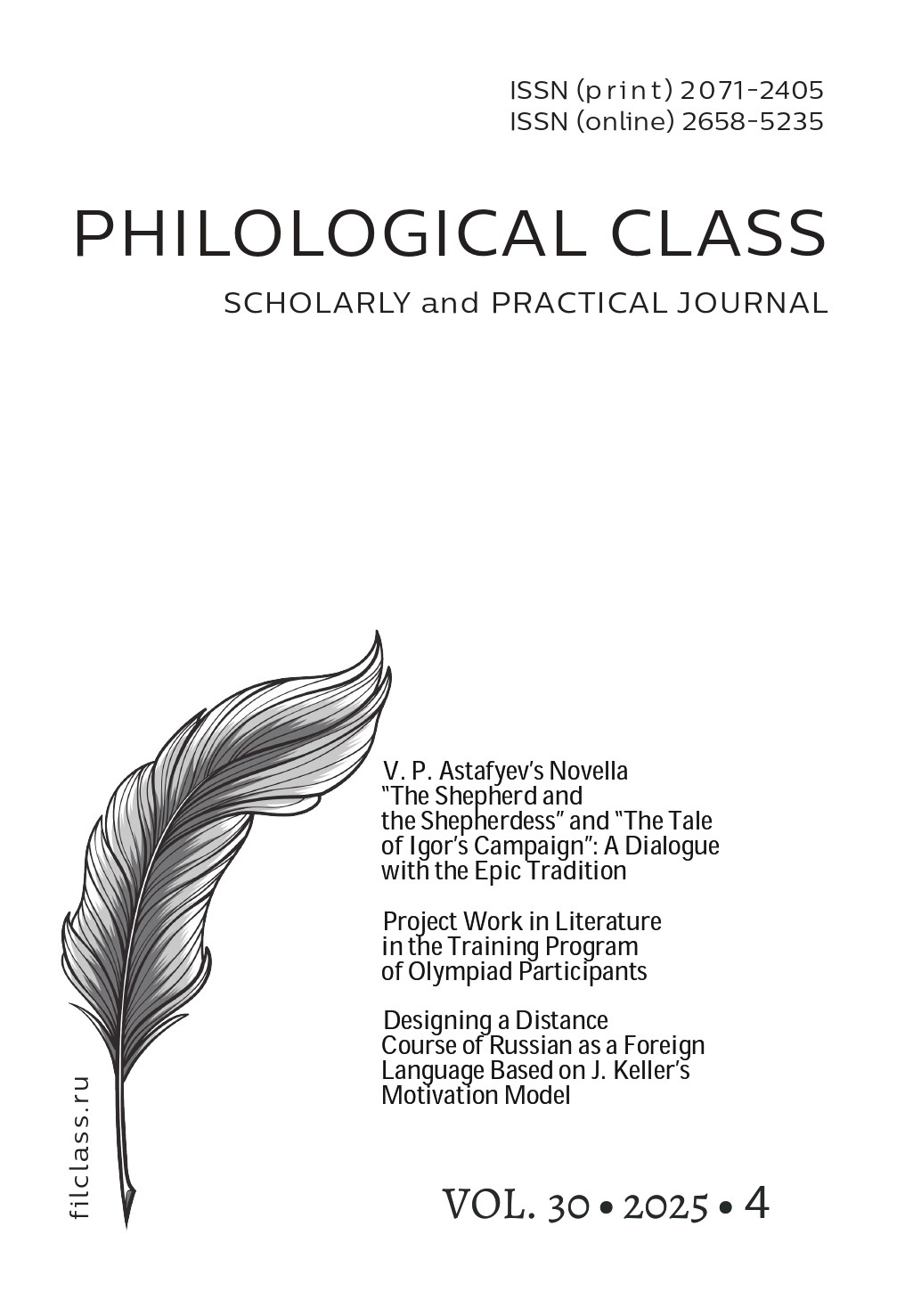Архив журнала
Absurd as a Means of Text Generation: Gogol – Bulgakov – Modern Media
- 852
- Article: PDF
Для цитирования:
For citation
Об авторе (авторах) :
Руженцева Н. Б.
Уральский государственный педагогический университет (Екатеринбург, Россия)
ORCID ID: https://orcid.org/0000-0002-1208-1202
SPIN-код: 9753-5994
Сроки публикации:
Дата поступления: 20.02.2025; дата публикации: 28.03.2025Список литературы:
Бабичева, Ю. В. Комедия-пародия М. Булгакова «Багровый остров» / Ю. В. Бабичева // Жанры в историко-литературном процессе. – Вологда : ВГПИ, 1985. – С. 138–152.
Бабичева, Ю. Фантастическая дилогия М. Булгакова: «Блаженство» и «Иван Васильевич» / Ю. Бабичева // М. А. Булгаков-драматург и художественная культура его времени. – М. : Союз театральных деятелей РСФСР, 1988. – С. 125–139.
Вепрева, И. Т. Языковая рефлексия в постсоветскую эпоху / И. Т. Вепрева. – М. : ОЛМА ПРЕСС, 2005. – 384 с.
Горячкина, М. С. Сатира Салтыкова-Щедрина / М. С. Горячкина. – М. : Просвещение, 1976. – 239 с.
Желтухина, М. Р. Комическое в политическом дискурсе конца ХХ века. Русские и немецкие политики / М. Р. Желтухина. – М. ; Волгоград : Издательство ВФ МУПК, 2000. – 264 с.
Каган, М. С. Философия культуры / М. С. Каган. – СПб. : Петрополис, 1996. – 415 с.
Карасик, В. И. Языковая кристаллизация смысла / В. И. Карасик. – Волгоград : Парадигма, 2010. – 422 с.
Костомаров, В. Г. Языковой вкус эпохи. Из наблюдений за речевой практикой масс-медиа / В. Г. Костомаров. – СПб. : Златоуст, 1999. – 320 с.
Лейдерман, Н. Л. Практикум по жанровому анализу литературного произведения / Н. Л. Лейдерман, М. Н. Липовецкий, Н. В. Барковская, Т. А. Ложкова ; Урал. гос. пед. ун-т. – Екатеринбург : [б. и.], 1996. – 46 с.
Ляпун, С. В. Ирония в газетной публицистике конца ХХ – начала XXI веков: стилистический прием и стилевая тенденция / С. В. Ляпун // Вестник Адыгейского государственного университета. Серия 2: Филология и искусствоведение. – 2009. – № 1. – С. 115–120.
Набоков, В. В. Лекции по русской литературе / В. В. Набоков. – М. : Независимая газета, 1996. – 440 с.
Руженцева, Н. Б. Абсурд в зеркале СМИ: язык-речь текст-дискурс / Н. Б. Руженцева // Политическая лингвистика. – 2023. – № 1 (97). – С. 19–26.
Садова, Т. С. Метаязыковая рефлексия современных советских СМИ: по-русски говоря / Т. С. Садова // Русистика в ХХI веке: тенденция и направление развития. – Ереван : ЕГУ, 2019. – С. 128–132.
Словарь русского языка : в 4 т. = МАС. Т. 1. – М. : Русский язык, 1981.
Сметанина, С. И. Медиа-текст в системе культуры (динамические процессы в языке и стиле журналистики конца ХХ века) / С. И. Сметанина. – СПб. : Издательство Михайлова В. А., 2002. – 383 с.
Шилихина, К. М. Семантика и прагматика вербальной иронии / К. М. Шилихина. – Воронеж : Наука-Юнипресс, 2014. – 304 с.
Яблоков, Е. А. Они сошлись… / Е. А. Яблоков // Михаил Булгаков, Владимир Маяковский: диалог сатириков. – М. : Высшая школа, 1994. – С. 5–56.
Язык Н. В. Гоголя : учеб. пособие / А. Н. Кожин, Э. А. Веденяпина, Н. А. Кожевникова [и др.] ; под ред. А. Н. Кожина. – М. : Высшая школа, 1991. – 176 с.


